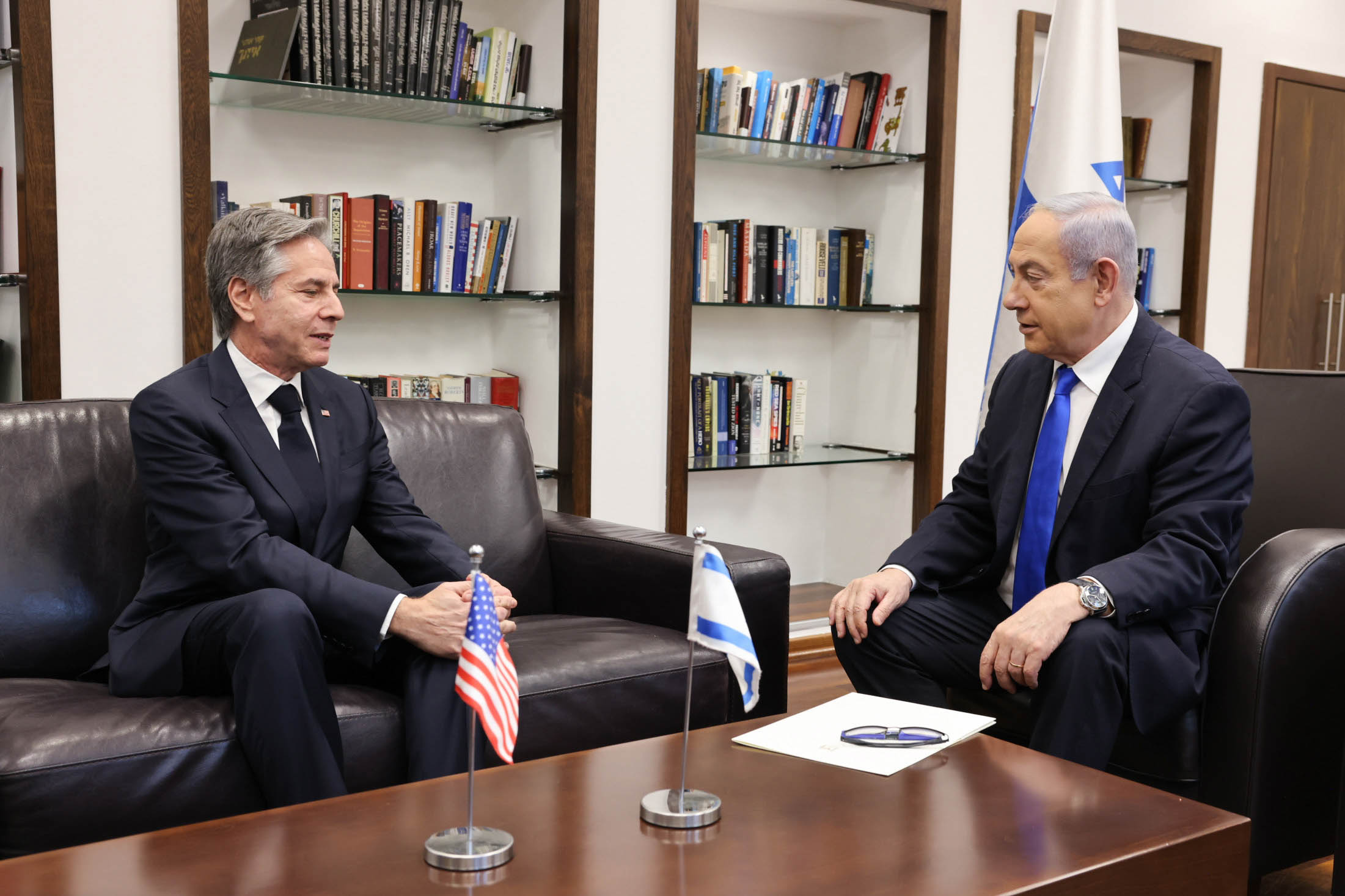Publications
INSS Insight No. 1822, January 30, 2024
For the past several years—and even more so since the start of the “judicial overhaul”—we have been warning about an impending crisis in relations between the United States and Israel. The war postponed these tensions, which had grown in the months before October 7, but now, following a period of unprecedented strategic cooperation, the gaps are widening around Israel’s handling of the war and “the day after.” The Biden administration is increasingly skeptical that the Israel Defense Forces (IDF) can achieve its military goals and is working to scale back the fighting and move onto the diplomatic stage—the centerpiece of which is an effort to advance the establishment of a Palestinian state as the key to reshaping a new regional order. Decades of frustration and pent-up anger over Israel’s ongoing rejection of fundamental US positions on the Palestinian issue are now erupting, along with a growing sense that Israel does not show gratitude for American support and that Prime Minister Benjamin Netanyahu is positioning himself in opposition to American policy for political gain. Congress is even intensifying efforts to condition military aid to Israel on a shift in Jerusalem’s policies toward the Palestinians. The war may have sidelined the crisis, but its scope and scale are likely to grow—especially after the November presidential election in the United States.
For the past several years—and even more so since the current Israeli government attempted to promote its “judicial overhaul”—the Institute for National Security Studies has been warning about an impending crisis in relations between Israel and the United States. Two primary processes form the backdrop for this assessment: changes in the demography of the United States in general, and its Jewish population in particular, of which are entirely unrelated to Israel; and the ever-increasing gap between the two countries on certain core issues, primarily their policies toward the Palestinians and Iran. The war between Israel and Hamas in the Gaza Strip sidelined the palpable tensions that had built up in the period leading up to the outbreak of the war—tensions that were expressed, inter alia, in harsh criticism by the US administration, which, for the first time, even expressed concern over Israel’s democratic future, not just reservations about some specific Israeli policy. Moreover, there was a prolonged period in which President Biden refrained from speaking with Prime Minister Netanyahu. Now, after three months of unprecedented strategic cooperation, the gaps are widening once again over Israel’s handling of the war and especially its lack of a strategy for “the day after.”
- The war’s goals and achievements thus far: American intelligence estimates that the IDF has killed only between 20 and 30 percent of Hamas’s fighters, demonstrating the organization’s resilience and casting doubt on Israel’s ability to achieve the military goals it set out for the war. As a result, the United States has reportedly downgraded its expectations of the war, from toppling Hamas, to minimizing the military threat that it poses. Thus, US Secretary of State Anthony Blinken stated that the war’s goal is to “ensure that October 7 never happens again” and that “there is no military solution” to the Hamas problem.
- The “day after”: Blinken stressed that the region is at an “inflection point . . . that opens up an entirely different future.” Arab countries, he said, including Saudi Arabia, are currently willing to change their policies toward Israel and to grant it “the kind of security assurances and commitments and guarantees that they never would have given in the past” in exchange for the establishment of a Palestinian state. During Blinken’s visit to Israel, unnamed administration officials expressed deep disappointment over Netanyahu’s rejection of US positions (apart from opposition to a possible military strike in Lebanon), including the need for a revitalized Palestinian Authority to take control over both the Gaza Strip and West Bank; the establishment of a Palestinian state; increased humanitarian aid for Gaza; minimal civilian causalities in Gaza; and scaling back the intensity of the fighting there. They also expressed especially harsh criticism over his rejection of Saudi Arabia’s promised willingness to normalize ties with Israel, as well as (according to some reports) the agreement of Saudi Arabia and four additional Arab states, to contribute to the reconstruction of Gaza, as part of a revitalized Palestinian Authority—in exchange for a “path” to Palestinian statehood.

- A Palestinian state: Spokespersons for the Biden administration reiterated the importance that the United States attaches to the establishment of a Palestinian state, which it sees as the key to forging a new regional reality. In order to downplay disagreements with Israel, the president said that “there are a number of two-state solutions . . . There’s a number of countries that are members of the UN that are still—don’t have their own militaries. Number of states that have limitations.” Biden further rejected the claim that a two-state solution is not possible as long as the prime minister is in his position, adding that he believes an agreement is possible. National Security Adviser Jake Sullivan argued that regional normalization and the establishment of a Palestinian state are achievable in the not-too-distant future.
- The Iranian context: Blinken stressed that regional normalization, including provision of security assurances by Arab states to Israel, in exchange for the establishment of a Palestinian state, “would create an entirely new region.” In so doing, Iran would be isolated and this would constitute a very strong response to the problems that the Islamic Republic poses for both Israel and the United States.
- Growing frustration within the administration toward the prime minister and Israeli policy:
- President Biden was reportedly angry with the Israeli prime minister for rejecting an American request to transfer tax revenue to the Palestinian Authority and consequently refrained from speaking to him for over a month, until January 20. Until then, their war time phone calls took place on average more than once a week.
- Senior administration officials believe that US plans to reshape the region, which are predicated on the establishment of a Palestinian state, will have to wait for a new government to be elected in Israel. Nevertheless, they stressed that Netanyahu will not be in power forever and that they have even started preparing for “the day after Netanyahu.” Indeed, during his visits to Israel, Blinken met separately with members of the prime minister’s war cabinet, including Minister Benny Gantz, Head of the Opposition Yair Lapid, and figures from civil society.
- In particularly pointed comments, Blinken said that a reversal had taken place in the attitudes of regional leaders. Whereas, in the past, whenever progress had taken place in the Israeli–Palestinian peace process, it was “Arab leaders, Palestinian leaders, [who] had not done enough to prepare their own people for this profound change. I think a challenge now, a question now: Is Israeli society is prepared to engage on these questions?”
- Growing criticism in Congress: A proposal by Senator Bernie Sanders to condition US military aid to Israel on the administration’s assurances that that the IDF is not violating human rights or carrying out disproportionate attacks in Gaza, and that Israel is not preventing basic humanitarian aid from entering Gaza, was voted down by a sweeping majority of 72 senators versus 11 Democrats. Following the vote, 18 senators have already joined a new initiative that would condition US military aid to Israel on its adherence to international law, and more senators are expected to sign on. Another initiative, which would prevent the administration from bypassing Congress and approving aid to Israel on its own recognizance, is also underway. These initiatives are unlikely to garner a majority but the very fact that they have been raised at all, in a forum that was heretofore considered staunchly pro-Israel, indicates the deterioration in Israel’s standing. Senator Chris Van Hollen went so far as to say that the Israeli prime minister is more attentive to the extremist ministers in his coalition than to the president of the United States and that he has even “given Biden the finger.” Moreover, 15 Jewish members of Congress expressed joint support for the two-state solution.
- The upside: Despite the increased criticism, senior American officials have emphasized that the president will not cease his efforts to persuade the prime minister by means of quiet diplomacy, without significant public confrontations. Officials also noted that Israel was paying heed to the administration’s positions regarding the war’s prosecution and had allowed shipments of flour into the Gaza Strip. The administration is continuing its efforts, in coordination with France and other countries, to prevent escalation on the northern border.
Assessment
At the end of three and half months of fighting, the level of discomfiture within the Biden administration over both Israel’s military accomplishments thus far and its diplomatic positions is clearly rising. The administration still remains committed, in principle, to the goal of eliminating Hamas, but is increasingly skeptical about the IDF’s ability to do so. In the absence of expectations for a decisive Israeli military victory, the administration has started to lower its expectations with regard to the war’s outcome and is trying to bring about a faster end to the combat, along with a transition to both focused military operations and the diplomatic stage.

The administration has focused its efforts on an attempt to bring about what has become its primary goal, the establishment of a Palestinian state. The administration is well aware of the difficulties it will undoubtedly face and knows that it will take long and arduous negotiations, but establishment of a Palestinian state has become a virtual panacea for the problem posed by Hamas, achievement of a broader agreement, the means of ensuring Israeli security, a platform for regional normalization, and establishment of a pro-American axis to counter the Iranian threat. Against this backdrop, the administration’s disappointment over the Israeli prime minister’s rejection of American proposals for resuming the peace process is especially pronounced.
Normalization between Israel and Saudi Arabia, and subsequently with other Muslim nations, as part of a comprehensive move to reshape the Middle East around a pro-American, anti-Iranian axis, is the main incentive that the administration is dangling before Israel, in an effort to move it toward an agreement. The administration, drawing on the experience gained from previous spats with Netanyahu, is keen to stave off a public crisis at least for the time being. Biden’s profound emotional commitment to Israel, along with political considerations ahead of the election in November, further contribute to this. Having said that, deliberate administration leaks about “the day after” are an expression of both the White House’s desire to pressure Netanyahu into making progress and an assessment that political change in Israel, which will greatly ease American efforts, may be on the horizon.
The war sidelined the tensions and growing collision course that have characterized US–Israel relations in recent years, primarily over the Palestinian issue and, more recently, over the “judicial overhaul.” After October 7, the administration rallied to Israel’s side admirably—both on the diplomatic and military fronts, in what may have been the most striking demonstration of the American commitment to Israel’s security ever.
Israel, which initially enjoyed sweeping American support in the aftermath of October 7, is increasingly seen in the United States as the party responsible for events in the Gaza Strip. Decades of frustration and pent-up anger at Israel’s ongoing rejection of fundamental American policy, first and foremost the need to advance the two-state solution, are now reaching new heights, especially within the progressive flank of the Democratic Party, but not just there. There is also a growing sense within the administration that Israel does not show gratitude for the exceptional support that the United States has given it, and not only continues to reject American positions, but the prime minister even makes use of his opposition to the US policy for his own political advantage.
Fundamental changes are underway in American demography that are unrelated to Israel, but have a negative impact on the US relations with it—chiefly the rapid growth of population groups that have little affiliation with Israel. The Jewish population too, the vast majority of which is liberal, is moving away from Israel and is disagreeing with many of its policies—especially its young people. The Muslim population in the United States is also growing in size and is becoming increasingly organized politically, including in lobbying groups, and their supporters are increasingly found in positions of influence in the government and the media.
A real crisis in relations is unlikely before the US presidential election, but tensions remains high and the crisis could erupt any time during a second Biden term, or if Donald Trump, who bears a grudge toward Netanyahu and Israel in general, returns to the White House. The danger of American military aid to Israel being conditioned on a change in Israeli policy toward the Palestinians—a position that, until recently, was espoused only among the most radical fringes of American politics—is becoming a real and present threat. The IDF’s long-term force planning is predicated on the continuation of the current 10-year American aid package, which ends in 2028, and a further and even larger one thereafter. These basic assumptions can no longer be taken for granted, and the Israeli government would be well advised to treat this with the utmost seriousness it warrants and to alter its policies accordingly.



